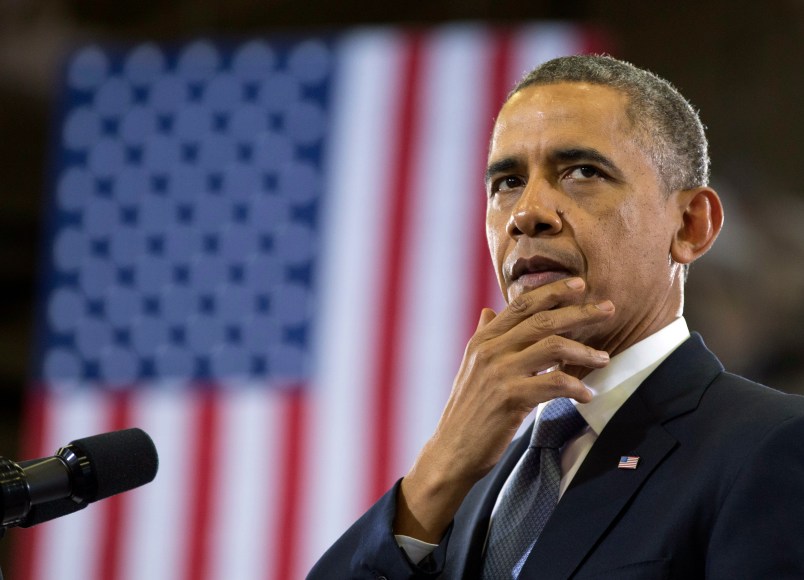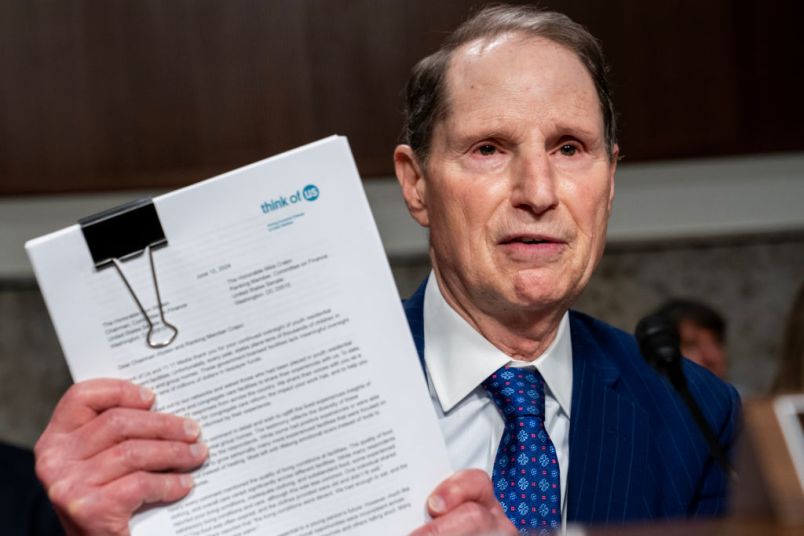WASHINGTON (AP) — With peace talks failing, Syria’s government on the offensive and moderate rebels pushed aside by al-Qaida-linked militants, the Obama administration is struggling for new ideas to halt a savage civil war.
Extending beyond Syria, the crisis is also an accelerating national security threat to the United States, officials say. And that, in part, has led to a fresh look at previously shelved ideas, including more robust assistance to Western-backed rebels.
Officials also have looked at newer, more far-reaching options, including drone strikes on rebel factions who might aspire to attack the United States — though such strikes are seen as unlikely for now.
American officials remain hampered by the same constraints that have stymied the U.S. response throughout the three-year civil war, including concern that lethal assistance could end up in the hands of extremists. And then there also is President Barack Obama’s own distaste for military action.
Speaking cautiously, White House spokesman Jay Carney said Tuesday, “We have to examine what the alternatives some might be proposing are and whether they’re in our national security interest.” He added that the administration also was concerned about whether stepped-up intervention could lead to “unintended consequences.”
Obama has yet to approve any policy shift. But his top aides plan to meet at the White House before week’s end to examine options, according to officials. They weren’t authorized to talk publicly on the matter and spoke only on condition of anonymity.
Giving new impetus to the review is what the Obama administration calls Syria’s emerging “threat to the homeland.” In recent weeks, the president’s senior national security aides have delivered dire warnings about extremist havens in Syria, and about Americans and other Westerners joining the fight and being radicalized.
“Syria has become a matter of homeland security,” Homeland Security Secretary Jeh Johnson said this month.
In separate testimony before Congress, National Intelligence Director James Clapper estimated there were about 26,000 extremists in Syria, including around 7,000 foreigners, in an insurgency encompassing 75,000 to 110,000 fighters. Jabhat al-Nusra, for example, one of the most powerful rebel factions, has “aspirations” for attacks on the United States, he said.
By any account, the current U.S. policy of sending limited military aid for Syria’s moderate opposition coupled with support for U.N.-brokered peace talks between the rebels and Syrian President Bashar Assad’s government isn’t working.
Appalling scenes of emaciated children leaving the besieged city of Homs last week underscored the desperate plight of many Syrians — and the potential for more suffering. A second round of Geneva negotiations ended last weekend with little promise for a future breakthrough and with fresh American frustrations with Russia, which is Assad’s most powerful military and diplomatic supporter.
The administration concedes Assad’s hold on power has strengthened.
For Obama, Syria presents no easy answers. After more than a decade of fighting in Afghanistan and Iraq, he has desperately sought to avoid embroiling the nation in another deadly and inconclusive war. He backed away last year from his threat to take military action in response to a Syrian chemical weapons attack when it became clear Congress would not vote its approval.
Even options short of direct strikes pose difficulties.
U.S. officials say grounding Assad’s air force by enforcing a no-fly zone in Syria would require a large-scale attack on Syria’s advanced air defense systems. Military support for the opposition continues in the form of small weapons and ammunition. But proposals for sending more powerful weaponry still raises fears that it could fall into the hands of extremist rebels groups, which are melding with moderate rebels.
And senior administration officials say they remain opposed to Saudi Arabian deliveries of shoulder-launched, anti-aircraft missiles because of the potential risk to commercial aircraft.
“Right now we don’t think that there is a military solution,” Obama said last week following talks on Syria with French President Francois Hollande. At the same time, Obama called the situation on the ground “horrendous” and acknowledged “enormous frustration” with the Geneva peace talks.
Obama also met last week with Jordan’s King Abdullah II, a key U.S. ally whose small country is struggling to cope with a flood of Syrian refugees. Next month, Obama will travel to Saudi Arabia, which has been open in its call for tougher U.S. action.
On Tuesday, Secretary of State John Kerry offered lingering hope that peace talks could yield results. He said he was coordinating strategy with Russia, the Assad government’s strongest backer.
“Nobody expected in two meetings or three meetings that this was going to be resolved,” Kerry told reporters. “What we’re doing is sharpening what the differences are.”
However slowly, the potential for a terrorist base developing in northern Syria akin to Afghanistan before the Sept. 11, 2001, attacks may be changing the administration’s thinking.
In addition to worries about foreigners, officials cite concerns about small numbers of Americans who’ve fought in Syria and returned home. The officials describe these as a “handful,” with European countries facing “several dozen” similar cases. But they believe some were probably recruited by extremists, indoctrinated and provided terror training. And more Americans may be heading over to fight.
The stark assessments have prompted questions from Congress about potential action. So far, the administration hasn’t provided answers.
U.S. officials said missile strikes by drone or military aircraft against al-Qaida-linked forces have been considered, even if they are unlikely in the near future. The Pentagon has advised against any such strikes because of sketchy U.S. intelligence on the rebel forces in Syria, according to two U.S. officials.
To monitor the threat, officials said, the U.S. and its allies are trying to track any Western fighter returning home from Syria.
___
Associated Press writers Kimberly Dozier in Washington and Matthew Lee in Paris contributed to this report.
___
Follow Bradley Klapper at http://twitter.com/bklapperAP and Julie Pace at http://twitter.com/jpaceDC
Copyright 2014 The Associated Press. All rights reserved. This material may not be published, broadcast, rewritten or redistributed.









